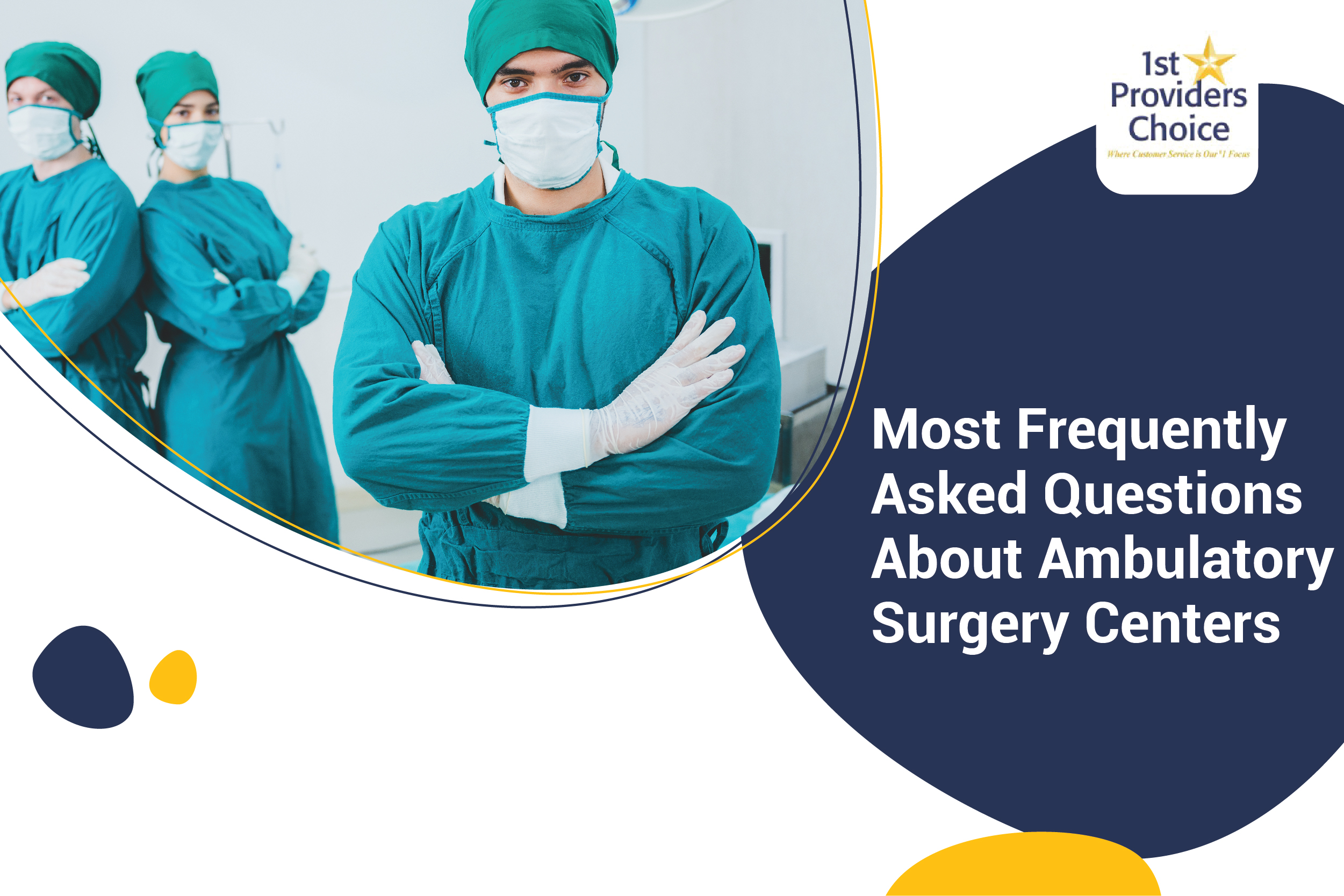Most Frequently Asked Questions About Ambulatory Surgery Centers
Posted by 1st Providers Choice on

Overview
Ambulatory Surgery Centers face specific challenges when it comes to their billing and coding procedure. However, they continue to improve their billing and coding services with new software, and better EMR/EHR. Their billing services do their best to file their claims on time. In contrast, there’s still a large difference between a physician and hospital billings compared to ASC billing services. The ASCs billing is in charge of billing for outpatient procedures performed by physicians, suppliers, and other non-institutional providers. On the other hand, physicians are responsible for cases created for work done by medical clinics, nursing workplaces, and hospitals for in-patient surgery. Both can be great, but ASC still has its advantages: lower costs, patient safety, reduced discomfort, and time-efficient.
These are answers to the most frequently asked questions in ASCs :
Which procedures are considered covered by CMS?
Centers need to be aware that not all operations in a hospital are acceptable in an ASC. To secure Medicare approval, the Centers for Medicare & Medicaid Services (CMS) must ensure that there is no substantial danger to patients or an overnight stay is not required after the treatment. If there are any hesitations, contact Medicare immediately.
Criteria for approving procedures include the following:
- Not a life-threatening risk
- It’s an elective procedure.
- It’s not safe to perform in a physician’s office.
- Urgent
What are the most common billing mistakes in ASCs?
-
A lack of clarity in coding
After the surgery, you must specifically describe all the procedures and elements performed. If not, then your coding staff might miss recording some of them. It is crucial since this will determine the billing. When you finish your documentation, check the details to confirm accurate coding.
-
Shortage of staffs
Take advantage of reputable billing agencies that can handle your billing and coding processes. If you’re short on staff, there’s bound to be recurring mistakes. Get the support you need to help eradicate errors and improve your cash flow.
-
Denial tracking is non-existent.
There could still be problems with income if you’re not tracking denial patterns. Your staff must track all claim denials, including the insurance that initially refused the claim, their reasoning, and the outcome. Next, you’ll examine the combination data to see if there are any patterns. If you experience denials because of coding errors by one or several payors, you’ll identify the matter and fix it.
What are the most common coding errors for ambulatory surgery?
- ASC charges don’t correspond to the procedure performed.
- Waiting for the surgical report to be completed before billing immediately.
- A coding error involves coding based on the procedure headings instead of the particular surgical report.
- Some procedures are billed the same even if they are different.
- Open and arthroscopic techniques are reported as one procedure.
What are the essential coding and billing for ASC charges?
Here are a few coding and billing basics for ASCs:
- Anesthesia services by the operating surgeon are examples of packaged services that are not “pass-through” supplies. Examples of “packaged” services include surgical cloths, splints, casts, associated materials, and anesthesiologist supervision.
- ASCs use a combination of physician and hospital billing, employing CPT and HCPCS codes.
- Pacemaker insertion is covered as part of the ASC, but not separately. In the procedure code, the cost will be included as one line item. According to the Medicare Physician Fee Schedule, most ASCs are not allowed to charge their services based on their allowable code.
- Only a few insurance companies permit ambulatory surgical billing to use ICD-10 procedure codes, just as hospitals do.
- Medicare wants to have ambulatory surgical billing done electronically using the CMS-1500 form, while most other insurance companies use the UB92 form.
How does the CMS define an ambulatory surgical center?
- The CMS guidelines describe ASCs as a distinct organization that offers surgical services exclusively to
- Medicare-certified hospitals can operate provider-based departments within hospitals or ASCs.
- ASCs must sign a participating provider agreement with the Centers for Medicare & Medicaid Services (CMS) to receive Medicare payments.
- CMS wants to introduce a “bed-less hospital” with most outpatient services to cut costs.
- In addition, patients will recover at home while still communicating with providers via digital means after same-day surgery.
What are some modifiers utilized in ASC billing?
- Modifier 74 – an indication that anesthesia was terminated after it was induced.
- This Modifier 76 is an indication that a physician repeated a procedure after the initial one was completed.
- To decide for Surgery- Modifier 57
- Modifier 59 – identified procedures or services, aside from E/M services CPT Modifier 77 – a report on repeated procedures by another physician.
Providing you with the Best
Choose only the best for your Ambulatory Surgical Center coding and billing process.
At 1st Providers Choice, we understand the need and expectations of our clients for a higher level of performance for billing software and EHR. That’s why we only offer the best and tailored medical billing system and EHR with features that will allow your practice to operate at its optimum potential and triple your revenue.
You can call us at (480) 782-1116 for immediate assistance, or you can schedule a free demo with our experts TODAY.